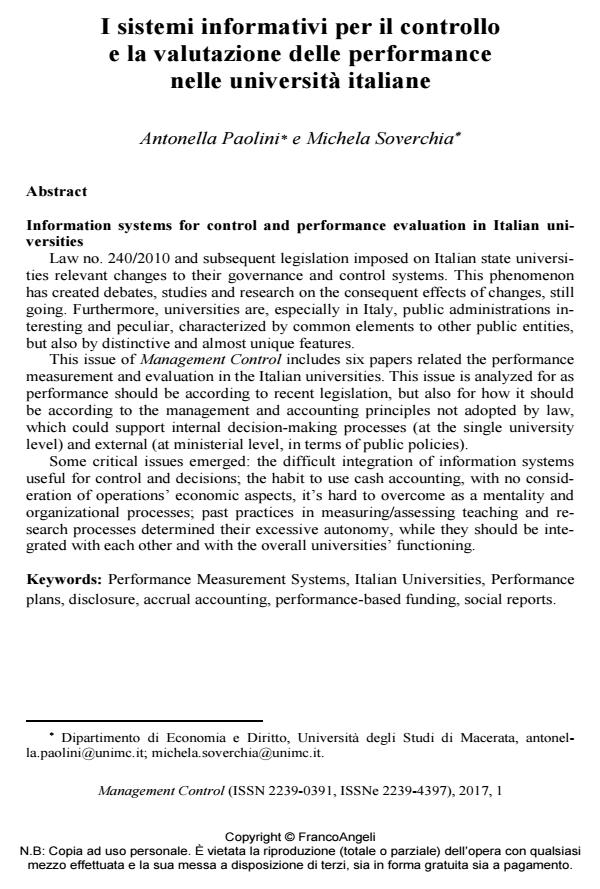Information systems for control and performance evaluation in Italian universities
Journal title MANAGEMENT CONTROL
Author/s Antonella Paolini, Michela Soverchia
Publishing Year 2017 Issue 2017/1
Language Italian Pages 10 P. 5-14 File size 293 KB
DOI 10.3280/MACO2017-001001
DOI is like a bar code for intellectual property: to have more infomation
click here

FrancoAngeli is member of Publishers International Linking Association, Inc (PILA), a not-for-profit association which run the CrossRef service enabling links to and from online scholarly content.
Law no. 240/2010 and subsequent legislation imposed on Italian state universities relevant changes to their governance and control systems. This phenomenon has created debates, studies and research on the consequent effects of changes, still going. Furthermore, universities are, especially in Italy, public administrations interesting and peculiar, characterized by common elements to other public entities, but also by distinctive and almost unique features. This issue of Management Control includes six papers related the performance measurement and evaluation in the Italian universities. This issue is analyzed for as performance should be according to recent legislation, but also for how it should be according to the management and accounting principles not adopted by law, which could support internal decision-making processes (at the single university level) and external (at ministerial level, in terms of public policies). Some critical issues emerged: the difficult integration of information systems useful for control and decisions; the habit to use cash accounting, with no consideration of operations’ economic aspects, it’s hard to overcome as a mentality and organizational processes; past practices in measuring/assessing teaching and research processes determined their excessive autonomy, while they should be integrated with each other and with the overall universities’ functioning.
Keywords: Performance Measurement Systems, Italian Universities, Performance plans, disclosure, accrual accounting, performance-based funding, social reports.
- Il ruolo dei manager universitari in un'ottica di performance integrata. Analisi di un caso studio Franco Rubino, Pina Puntillo, Stefania Veltri, in MANAGEMENT CONTROL 3/2017 pp.95
DOI: 10.3280/MACO2017-003007 - Legitimating efforts in Performance Plans. Evidences on the thoroughness of disclosure in the Italian Higher Education setting Alessandra Allini, Adele Caldarelli, Rosanna Spanò, Annamaria Zampella, in MANAGEMENT CONTROL 1/2019 pp.143
DOI: 10.3280/MACO2019-001007 - Il risk management approach nelle Università italiane: prime riflessioni su vincoli e opportunità Manuela Lucchese, Giuseppe Sannino, Paolo Tartaglia Polcini, in MANAGEMENT CONTROL 1/2020 pp.111
DOI: 10.3280/MACO2020-001006 - Il ruolo degli spin-off universitari nel contesto socio-economico locale: analisi degli indicatori di performance e innovazione Christian Corsi, in MANAGEMENT CONTROL 1/2018 pp.73
DOI: 10.3280/MACO2018-001004 - Un framework integrato per la misura dell'innovazione del Piano Nazionale Scuola Digitale (PNSD) Domenico Consoli, Selena Aureli, in MANAGEMENT CONTROL 1/2018 pp.139
DOI: 10.3280/MACO2018-001007 - Accounting Reform in Italian Universities. Internal Response to Accounting Change Marco Tieghi, Rebecca L. Orelli, Emanuele Padovani, in MANAGEMENT CONTROL 1/2018 pp.117
DOI: 10.3280/MACO2018-001006 - Informazioni budgetarie e prospettive di Behavioral Management Accounting nelle aziende sanitarie pubbliche italiane Domenico Raucci, Manuela Paolini, in MANAGEMENT CONTROL 2/2022 pp.117
DOI: 10.3280/MACO2022-002006 - Accounting change negli enti locali. Quali condizioni per il miglioramento nell'ottica gestionale? Luca Del Bene, Fabio Fiorillo, Iacopo Cavallini, Beatrice Caporaletti, in MANAGEMENT CONTROL 3/2019 pp.59
DOI: 10.3280/MACO2019-003004
Antonella Paolini, Michela Soverchia, I sistemi informativi per il controllo e la valutazione delle performance nelle università italiane in "MANAGEMENT CONTROL" 1/2017, pp 5-14, DOI: 10.3280/MACO2017-001001